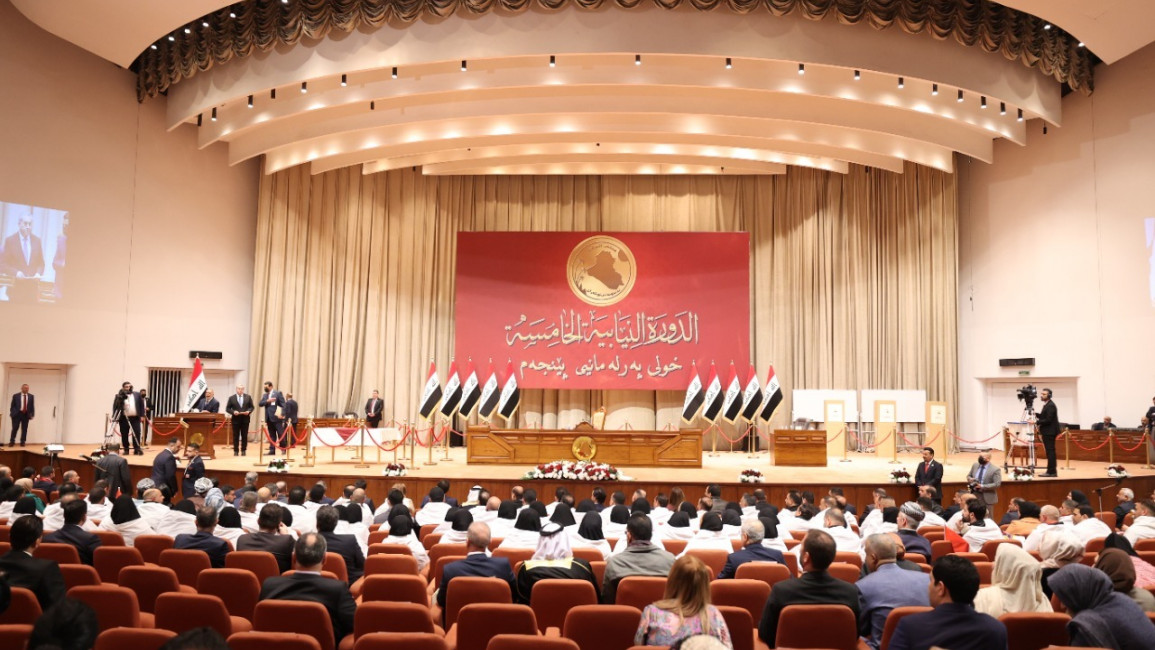Iraq

The Iraqi parliament has failed yet again to elect a president [Getty]
The division between the Sadrist faction and pro-Iran Shia factions in the Iraqi parliament is “dangerous” for Iraq’s stability and security, and “very likely” to escalate into a military conflict, a Kurdish lawmaker in the Iraqi parliament told The New Arab.
The Iraqi parliament on Wednesday postponed a session for electing a president indefinitely after pro-Iran Shia parties and some Kurdish and independent MPs boycotted it.
As a result the constitutional quorum of 220 lawmakers out of 329 was not met, the parliament announced.
This is the third time and the second this week that the assembly could not elect a president for Iraq due to the lack of consensus among the different Iraqi political sides.
“We boycotted today’s session since we are very concerned that the division among the Shia in the Iraqi political arena, especially between the Sadrists and the Coordination Framework, is dangerous for Iraq’s stability and security and for the survival of the current Iraqi political system because it is very likely to escalate into a military conflict,” Muthana Amin, an MP from the Kurdistan Islamic Union (KIU) told The New Arab in a phone interview on Wednesday.
“We have fears that attending a parliament session in which those divisions are settled in the interest of one side is dangerous for Iraq’s stability.”
Amin added that the core issue is not the Iraqi presidency, which is usually taken by an Iraqi Kurd, but it is the division of Iraq’s premiership and the ministries among the various Shia factions.
The Sadrist bloc headed by Shia cleric Muqtada al-Sadr, won the largest share of votes in parliamentary elections held on October 10, with 73 seats.
Sadr has formed the Rescue Alliance with Masoud Barzani’s Kurdistan Democratic Party (KDP) faction, and the Sunni Sovereignty Alliance headed by Khamis al-Khanjar.
The triple alliance have announced their nominations for the presidency and premiership, and vowed to form a national unity government in an attempt to marginalize the Coordination Framework, a pro-Iran Shia parliamentary faction that includes more than 100 MPs.
According to the Iraqi constitution, the parliament should elect the country’s president with a quorum of two-thirds of the lawmakers. The elected president will then be sworn in before the parliament, and would assign a candidate from the biggest parliamentary fraction to form a new government. 220 lawmakers must attend the special session for electing the president. Iraq’s supreme federal court has given lawmakers until 6 April to choose a new president.
A parliamentary source told AFP that only 178 out of 329 lawmakers were present in parliament on Wednesday. Lawmakers from the Coordination Framework and four Kurdish factions boycotted the session.
After the session ended, Sadr quickly posted a tweet vowing that he “will not make a consensus” with pro-Iran factions, adding that such a consensus “means the end of the country.”
“While there are frequent foreign interferences in Iraq, and almost 80 percent of the Iraqis no longer believe in the political process, we think that claims by a certain political force of winning a national majority with only 800,000 votes is not suitable for Iraq,” Amin said in reference to Sadr’s attempts to form a national unity government without the pro-Iran factions.
Nouri al-Maliki, the pro-Iran former Iraqi prime minister and leader of State of Law Coalition has said he is working on an initiative to deal with the current political deadlock, without revealing details yet.
english.alaraby.co.uk
